Introduction
Published online by Cambridge University Press: 22 September 2009
Summary
We are pleased to present the first complete English translation from the Latin of Isidore's Etymologies. Isidore, Bishop of Seville, compiled the Etymologies (also known as the Origins) in the late teens and twenties of the seventh century, and left it nearly complete at his death in 636. In the form of an encyclopedia, it contains a compendium of much of the essential learning of the ancient Greco-Roman and early Christian worlds. In his important study of the Latin literary culture of medieval Europe, Ernst Robert Curtius spoke of the Etymologies as serving “the entire Middle Ages as a basic book.” It was arguably the most influential book, after the Bible, in the learned world of the Latin West for nearly a thousand years.
To get an idea of what a seventh-century Irish monk, or a lecturer at a cathedral school in the eleventh century, or an Italian poet of the fourteenth century, or a lexicographer of the sixteenth century could learn from the Etymologies, one might pick a bit of lore from each of the twenty books in which the work has come down to us. From Isidore, then, we learn that:
Caesar Augustus used a code in which he replaced each letter with the following letter of the alphabet, b for a, etc. (I.xxv.2).
Plato divided physics into four categories: arithmetic, geometry, music, and astronomy (II.xxiv.4).
The term ‘cymbal’ derives from the Greek words for “with” and “dancing,” σúν and βαλά (III.xxii.12).
- Type
- Chapter
- Information
- The Etymologies of Isidore of Seville , pp. 3 - 28Publisher: Cambridge University PressPrint publication year: 2006
- 1
- Cited by

